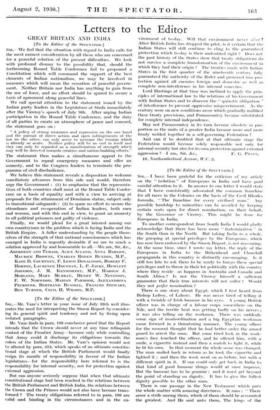[To the Editor of the SPECTATOR.]
Spa,—Mr. Vaze's letter in your issue of July 19th well illus- trates the need for interpreting the Simon Report by consider- ing its general spirit and tendency and not by fixing upon isolated paragraphs.
Mr. Vaze finds in para. 199 conclusive proof that the Report intends that the Crown should never at any time relinquish control of the Frontier Army—because only while controlling that Army could it discharge its obligations towards the rulers of the Indian States. Mr. Vaze's opinion would not be altered by para. 213, which speaks of an ultimate constitu- tional stage at which the British Parliament would finally resign its mantle of responsibility in favour of the Indian legislatures—for the responsibility here referred to is the responsibility for internal security, not for protection against external aggression.
But can anyone seriously suppose that when that ultimate constitutional stage had been reached in the relations between the British Parliament and British India, the relations between the-Crown and the Princes would not also have become trans- formed?- -The treaty obligations referred to in para. 199 are valid. 'and binding in the circumstances and in the en- vironment of to-day. Will that environment never ailer ? After Brit ish India has dropped the pilot, is it certain that the Indian States will still continue to cling to the guaranteed protection which to-day is their undoubted right ? Does not the past history of the States show that treaty obligations do not survive a complete transformation of the .•lis ininment in which they had their origin ? The treaties ittade with Indian States in the first quarter of the nineteenth century fully guaranteed the authority of the Ruler and promised him pro- tection against all enemies foreign and domestic as well as complete non-interference in his internal concerns.
Lord Hastings at that time was inclined to apply the prin- ciples of international law to the relations of his Government with Indian States and to disavow the " (asta( ie obligation'' of interference to prevent oppressive misgovernment. As the century wore on new conditions arvee which gradually nullified these treaty provisions, and Paramountcy became substituted for complete internal independence.
May not Paramountcy in its turn become obsolete in pro- portion as the units of a greater India became more and more firmly welded together in a self-governing Federation ? . And can it be doubted that at that ultimate stage the Federation would become solely responsible not only for internal security but also for its own protection against external
































 Previous page
Previous page